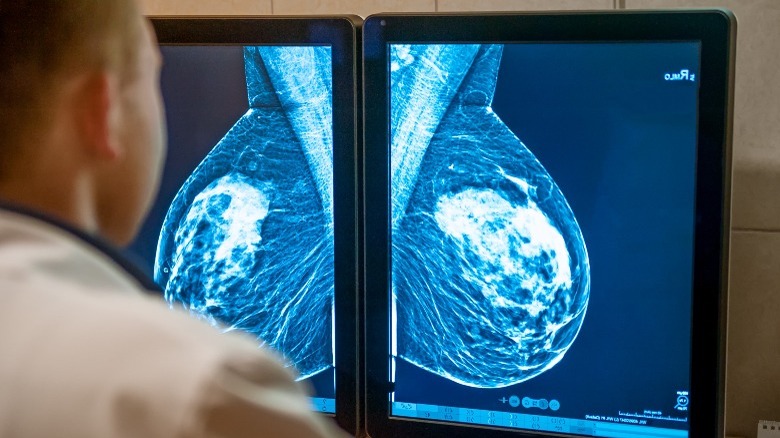The Real Rate Of Breast Cancer Overdiagnoses May Surprise You
While mammogram screenings have been known to lead to overdiagnoses of breast cancer, a new study reveals that the rate is not as high previously thought. According to U.S. News & World Report, researchers previously believed that roughly 15% of women diagnosed with breast cancer following a regular mammogram screening were overdiagnosed. This means that had they not undergone a mammogram screening, the tumors were unlikely to cause harm.
The new data suggest that roughly seven out of 1,000 women are diagnosed with breast cancer after a mammogram screening. The data further reflect that a mere one out of 1,000 women will be overdiagnosed with cancer. The data was derived from the Breast Cancer Surveillance Consortium which studied 36,000 American women, ages 50 to 74, between the years 2000 and 2018 (via U.S.News & World Report).
Dr. Katrina Armstrong, of Massachusetts General Hospital in Boston, told U.S.News & World Report that while the lower ratio of breast cancer overdiagnoses uncovered by the study is good news, on a macro level, there are still many women who receive an overdiagnosis. If overdiagnoses could be completely eliminated, that would spare close to 25,000 women unnecessary treatment and unneeded distress.
Overdiagnosis and DCIS
According to the American Cancer Society, DCIS, or ductal carcinoma in situ, happens in about 20% of newly diagnosed breast cancer cases. DCIS is a type of cancer that has infiltrated the breast cells that line the milk ducts but has not spread to breast tissue. DCIS tumors are examples of the kinds of tumors associated with breast cancer overdiagnoses since most DCIS cases do not become invasive.
However, Dr. Katrina Armstrong points out to U.S. News & World Report that it is still impossible to be sure which of the DCIS cases will or will not become invasive. In the meantime, studies are examining how well DCIS cases can be managed through regular monitoring rather than treatments that would otherwise involve surgery, chemotherapy, radiation, or some combination of these.
Screenings are designed to detect diseases in their early stages. While they serve an important purpose, the study's author Ruth Etzioni, a professor at Fred Hutchinson Cancer Research Center in Seattle, acknowledges that they aren't perfect and the risk of an overdiagnosis remains a possibility. While studies look into improving mammogram screening technology, Dr. Armstrong encourages women to exercise regularly and limit alcohol consumption to help reduce their breast cancer risk (via U.S. News & World Report).


